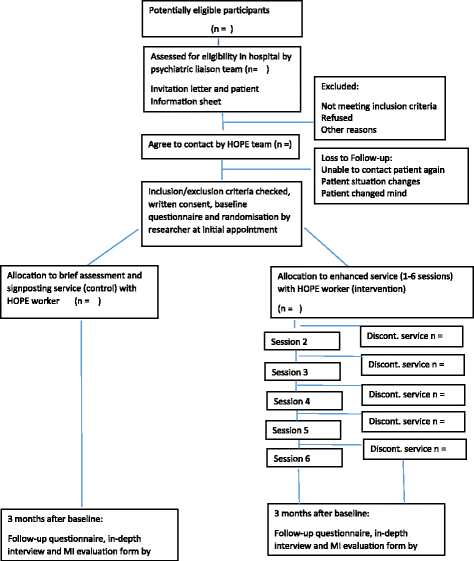HOPE: Help fOr People with money, employment, benefit or housing problems: study protocol for a randomised controlled trial
- PMID: 29043091
- PMCID: PMC5629806
- DOI: 10.1186/s40814-017-0179-y
HOPE: Help fOr People with money, employment, benefit or housing problems: study protocol for a randomised controlled trial
Abstract
Background: Self-harm and suicide increase in times of economic recession. Factors including job loss, austerity measures, financial difficulties and house repossession contribute to the risk. Vulnerable individuals commonly experience difficulties in navigating the benefits system and in accessing the available sources of welfare and debt advice, and this contributes to their distress. Our aim is to determine the feasibility and acceptability of a brief psychosocial intervention (the "HOPE" service) for people presenting to hospital emergency departments (ED) following self-harm or in acute distress because of financial, employment, or welfare (benefit) difficulties.
Method: A pilot study including randomisation will be employed to determine whether it is possible to undertake a full-scale trial. Twenty people presenting to the ED who have self-harmed, have suicidal thoughts and depression and/or are in crisis and where financial, employment or benefit problems are cited as contributory factors will be asked to consent to random allocation to the intervention or control arm on a 2:1 basis. People who require secondary mental health follow-up will be excluded. Those randomised to the intervention arm will receive up to six sessions with a mental health worker who will provide practical help with financial and other problems. The mental health worker will use the motivational interviewing method in their interactions with participants. Control participants will receive one session signposting them to existing relevant support organisations. Participants will be followed up after 3 months. Participants and the mental health workers will take part in qualitative interviews to enable refinement of the intervention. The acceptability of outcome measures including the PHQ-9, GAD-7, repeat self-harm, EQ5D-5L and questions about debt, employment and welfare benefits will be explored.
Discussion: This study will assess whether a full-scale randomised trial of this novel intervention to prevent self-harm among those distressed because of financial difficulties is feasible, including the acceptability of randomisation, potential rate of recruitment and the acceptability of outcome measures.
Trial registration: ISRCTN58531248.
Keywords: Financial difficulties; Motivational interview methods; Pilot study; Psychosocial intervention; Self-harm.
Conflict of interest statement
Ethics approval and consent to participate
The study received ethical approval from South West Central Bristol Research Ethics Committee (REC: 16/SW/0005). Individual consent was taken for each participant including consent to report anonymised data.
Consent for publication
Not applicable.
Competing interests
The authors declare that they have no competing interests.
Publisher’s Note
Springer Nature remains neutral with regard to jurisdictional claims in published maps and institutional affiliations.
References
-
- Corcoran P, Griffin E, Arensman E, et al. Impact of the economic recession and subsequent austerity on suicide and self-harm in Ireland: an interrupted times series analysis. International J of Epi. 2015:969–77. doi:10.1093/ije/dyv058. - PubMed
Grants and funding
LinkOut - more resources
Full Text Sources
Other Literature Sources


